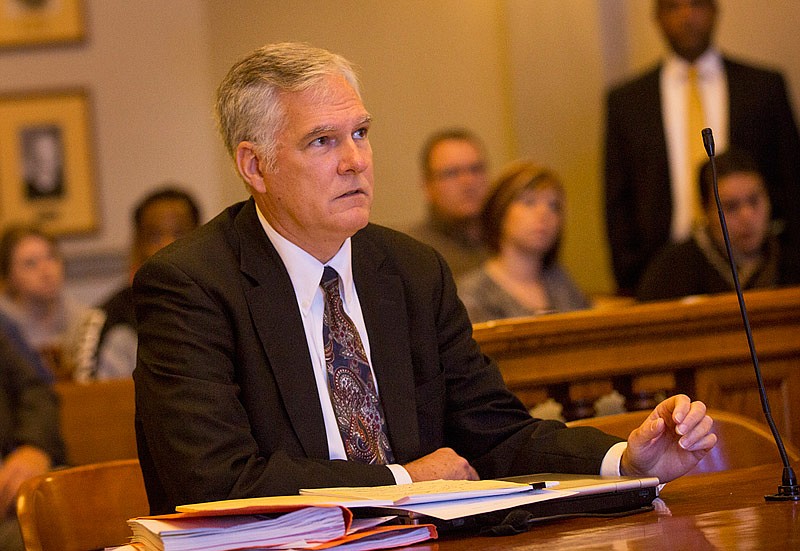The Missouri court of appeals in Kansas City on Tuesday upheld Cole County Circuit Judge Pat Joyce's October 2017 finding that Prosecutor Mark Richardson "knowingly and purposefully violated the Sunshine Law."
Joyce ordered Richardson to pay $12,100 to Aaron Malin, the plaintiff in the 2015 lawsuit.
And, in an amended order last March, Joyce ordered Richardson to pay an additional $24,070 to cover Malin's attorney fees.
Tuesday's appeals court order, while agreeing with Joyce's rulings, sent the case back to Joyce so she could "determine the reasonableness of Malin's attorney fees on (the) appeal and enter an appropriate award."
Richardson could not be reached for a comment for this story.
Locke Thompson succeeded Richardson as prosecutor on Jan. 1, and told the News Tribune on Tuesday he didn't plan any further appeal of the case.
"I obviously made a point during the election that I thought Mark violated the Sunshine Law in this case, (and) the Western District made it clear with their ruling," Thompson said. "We are going to be completely transparent and abide by the law while I'm in office. Unfortunately in this case, we will probably have to pay a fine."
Malin told the News Tribune he was "thrilled" with the appeals court ruling.
"It's really important that government agencies are held accountable, especially law enforcement agencies and prosecutors' offices," he said. "If they don't comply with the Sunshine Law, they should be taken to court.
"Hopefully this is a deterrent so other agencies will be warned and see that this law will be enforced. As taxpayers and citizens, it's one of the more important ways to keep checks on the government."
Malin's case began as he was studying connections between law enforcement officials and drug cases.
On three separate occasions from April through October 2015, the appeals court ruling noted, Malin asked Richardson for correspondence between Richardson and the Mustang Drug Task Force; copies of charges Richardson filed relating to narcotic sales in public housing, beginning in July 2014; and Sunshine Law requests made to Richardson, as well as his responses, running from January 2015 to the present.
"Each Sunshine Law request mirrored the Sunshine Law and stated that the records were to be provided without redactions, or with only redactions permitted by law," Judge Mark Pfeiffer noted for the three-judge appeals court panel, "and that if any part of the request was denied, that the specific exceptions relied upon for each denial be listed.
"On each occasion, (Richardson) responded with general objections to the records requests, sometimes untimely, and indicated that the request was too burdensome and the task of searching for any responsive documents simply would not be performed; further, (Richardson) stated his conclusions 'without confirming or denying the existence of records you requested.'"
After Malin received those responses, he hired attorney Dave Roland of the Freedom Center of Missouri in Mexico, Missouri, and Roland sent Richardson a letter detailing the prosecutor's "untimely and statutorily deficient form of" his answers.
Pfeiffer noted: "(Richardson) ignored the letters from Malin's attorney, (who) then filed the instant Sunshine Law suit, and only then, after many months of protracted litigation, did the Prosecutor provide partial responses to some of the requests."
However, Joyce found - and the appeals court agreed - those were not the answers Missouri's Open Records/Open Meetings Law required.
As part of the court's nine-page ruling, Pfeiffer wrote: "There is no dispute that the Prosecutor is a 'public governmental body' as defined (by the Sunshine Law) (and) there is also no question that records retained by the Prosecutor constitute 'public records' as defined in (the law)."
The appeals court ruling also noted, in his appeal of Joyce's ruling, Richardson "does not dispute that his conduct constituted a knowing, purposeful violation of the Sunshine Law; rather, the Prosecutor's argument on appeal is confined to whether the circuit court's summary judgment was erroneous because: 'law enforcement record exemptions designed to protect public safety in the Sunshine Law apply to the communications between (Richardson) and [the MUSTANG drug task force and its employees and associates].'"
However, the appeals court said, Joyce's ruling never prevented Richardson from protecting records that aren't "open" records under the law - she only ordered him to search through all his records, provide the ones that are open and explain (as the law requires) why other records weren't available.
Richardson also objected to the $12,100 fine.
However, the appeals court pointed out the law allows a $5,000 fine for each "purposeful" violation of the Sunshine Law - and Joyce found Richardson had several of those violations.
Roland said, in a news release issued by the ACLU of Missouri: "(The) decision is a welcome reminder that public officials will face consequences if they attempt to declare their offices exempt from transparency."
And Tony Rothert, the ACLU of Missouri's legal director, added: "When the Sunshine Law is respected and protected, it helps establish trust between the government and the community."

